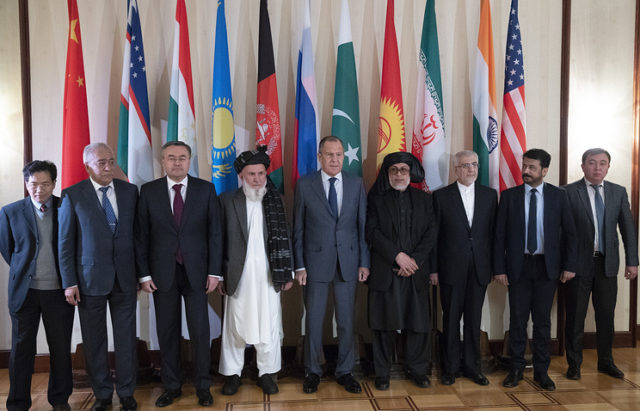
Russia’s Peace Conference on Afghanistan: What Does It Mean?
Publication: Eurasia Daily Monitor Volume: 15 Issue: 162
By:

Last week (November 9), Russia finally convened its long-heralded peace conference on Afghanistan. Attending the conference were members of the Taliban as well as the governments of Pakistan, Kazakhstan, Kyrgyzstan, Tajikistan, Uzbekistan, Iran and China. A representative of the Embassy of the United States in Moscow also attended as an observer, as did members of the Afghan government’s Peace Council, but no member of the formal government in Kabul (Al Jazeera, November 9; TASS, November 12). The so-called “Moscow format consultations” are intended “to coordinate the development of an inclusive intra-Afghan dialogue toward promoting the process of national reconciliation and the restoration of peace as soon as possible in the long-suffering Afghan state” (Mid.ru, November 9).
More to the point, this represents Moscow’s attempt to return to a position of influence in Afghanistan by brokering an agreement that includes the Taliban as part of a reconstituted Afghan government. This is also the first time the Taliban has ever attended such a session. But the peace conference in Moscow is by no means a disinterested act of altruism on the part of Russia or a manifestation of concern over international terrorism; the Taliban’s militant activities, after all, have not stopped even while negotiations proceed. Rather, it epitomizes, among other things, Moscow’s expanding collaboration with the Taliban that began with intelligence sharing and consultations in 2013 and has continued up to the present (Ifri.org, September 2018). This cooperation has occurred because Moscow claims to be increasingly concerned that the Islamic State might supplant the Taliban in Afghanistan; Russia regards the Taliban as a force that is not likely to threaten Central Asia if it enters the Afghan government. Moscow argues that it is impossible to make peace with the Taliban—even if they are “terrorists”—except by bringing them to the table (RT, November 12), which is not typically Russia’s position on radical militant groups.
In other words, and despite Russian rhetoric to the contrary, the Taliban, like Hezbollah, has become for Russia, “good terrorists” with whom it thinks it can strike a deal and who can become a means for advancing Russian interests in any postwar government in Kabul. In this context, it is telling that Russia’s long-serving presidential special representative for Afghanistan, Zamir Kabulov, who played a prominent role at the conference, stated that not only had the US and North Atlantic Treaty Organization (NATO) lost the war, their presence in Afghanistan made things worse. He said that the remote South Asian country is “literally our underbelly,” and the interests of Russia and its allies (whoever they may be) are at stake there. He also observed that only a regional approach, presumably involving Central Asia, Iran, China, India and Pakistan (the latter of which actually sponsors various militant groups all over Afghanistan—see Militant Leadership Monitor, September 6, 2017) will work to finally bring security to Afghanistan (Interfax, November 12, 2018).
Russia, like other observers, apparently sees the US as bogged down in Afghanistan and therefore perceives an opportunity to achieve several Russian objectives simultaneously (Ifri.org, September 2018). It aims to regain enduring influence in Afghanistan; discredit US military and political performance; strengthen its alliance with China that is manifested in its warming relations with Pakistan—probably at China’s suggestion—whose interests will gain from the Taliban’s inclusion in the government; and also simultaneously retain its influence and strong ties with India, a long-standing partner. Indeed, the fact that neither Washington nor Kabul were officially represented at the Moscow talks suggests the fundamentally anti-US and de facto anti-Afghan motives underlying Russian policy. We should thus not expect much in the way of a viable or acceptable road to peace out of this conference. Instead, like a lot of Russian foreign policy, the Moscow meeting may ultimately be little more than a propaganda stunt.
Nevertheless, if this is the case, why are major governments like India participating? India, of course, has vital interests in the future of Afghanistan as well as long-standing concerns that Pakistan uses that war-torn country to both challenge those Indian interests and incite terrorist attacks there. New Delhi has long supported the idea, therefore, that an Afghan peace must be made and owned by the Afghans themselves, not third parties (Al Jazeera, November 9). However, under the circumstances where even the US, not to mention other parties, have already had discussions with the Taliban (in the US case, bilateral meetings in the Gulf), India is hard-pressed not to attend lest its interests become marginalized as a result of its absence.
In the final analysis, the November 9 conference represents another of Moscow’s many efforts to convince itself, the Russian people and international audiences that it truly is a global power able and willing to propose constructive solutions to current world crises. Put another way, Moscow is seeking recognition that it deserves a stature comparable to what it had in 1945.



